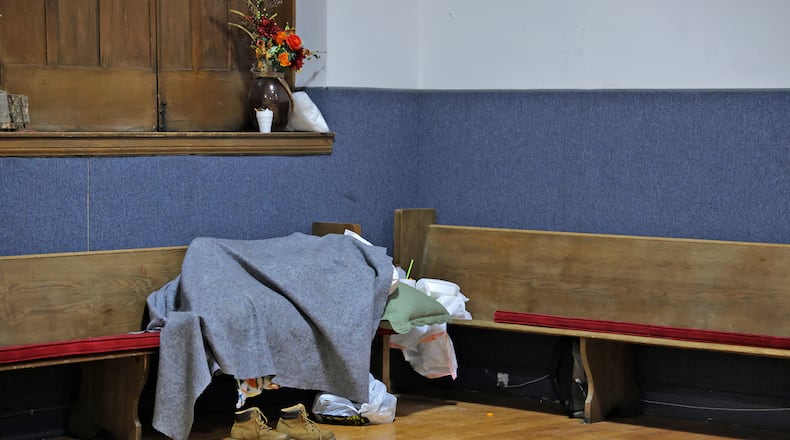Logan Cobbs, community development director for the city, said at the meeting that the goals listed in the city’s request for proposal are an “immediate expansion of temporary and crisis housing capacity and enhanced access to mental health, addiction recovery and employment services, and strengthened prevention measures to reduce individuals entering homelessness.”
The city will award up to $400,000 with a combination of Community Development Block Grant and Emergency Solutions Grants Program funds through the Department of Housing and Urban Development, Cobbs said.
“We fully understand that those experiencing homelessness are often facing very complex challenges, and we’re deeply committed as a staff, as an organization and as a community to supporting those individuals in our community,” Cobbs said. “We know that addressing homelessness requires a long-term solution — not just a temporary solution."
Several community members pointed to a present need for more shelter with bitter cold endangering those experiencing homelessness, and there being only one warming shelter open overnight.
The county’s warming shelter, run by the Nehemiah Foundation, opens when temperatures are consistently in the single digits.
This leaves the volunteer-run warming center at the Victory Faith Center church in downtown Springfield as the only warm place to stay overnight for the time being for many who are not in Sheltered Inc. shelters.
Credit: Bill Lackey
Credit: Bill Lackey
The VFC warming center has a 90-day permit that will expire March 2, at which point organizer Kenneth “Barron” Seelig said he and volunteers will re-evaluate its need.
“On that day with a lot of prayer and a lot of stuff we’re going to decide whether we’re going to go on, but let’s look at some long-term solutions,” Seelig told commissioners.
During the city meeting, multiple people staying at the warming center praised Seelig and volunteers for the services they’ve provided, and urged the city to follow suit.
The city previously turned down a proposal submitted because it did not meet funding requirements, it said, but was looking for an organization to submit a proposal by this past Friday.
Springfield’s only non-congregate shelter closed in August after the city, in a split vote, rejected a proposal for Dayton-based homelessness nonprofit Homefull to operate the site.
Credit: Bill Lackey
Credit: Bill Lackey
The resolution that commission rejected would have approved up to $1.04 million in federal funds to Homefull for one year for services performed, with the option to renew for three more one-year periods.
Springfield is a HUD entitlement community, finance director Katie Eviston said during the meeting, meaning that it is eligible for Community Development Block Grants to help “develop viable urban communities by providing decent housing and a suitable living environment,” according to the federal Department of Housing and Urban Development.
Applicants must meet financial management, oversight, program performance and documenting requirements set by the federal government to receive these funds, Eviston said. She encouraged anyone interested to apply for any funding being offered and not to be discouraged if they’re told they are ineligible for a certain type of funding.
Tracey Tackett, a city commissioner, said during the meeting that the current housing shortage and increased rent prices are contributing to the problem.
Commissioner Krystal Brown said during the meeting that she was discouraged in July 2023 when members of the community showed up “in droves” to oppose a proposed affordable housing complex for those experiencing chronic homelessness across from Fulton Elementary School. It would have been a 30-unit apartment complex, but rezoning for the project failed in a split vote following the strong opposition.
“That was very disheartening for me during that time, so when we have these opportunities that we have the funding to put things in place for individuals with complex needs,” Brown said. “We had to take that opportunity at that time but we missed it.”
Tackett said she and Cobbs visited some homeless encampments recently, learning that people avoid shelters for various reasons, like wanting to keep their pets, having warrants or other factors.
Credit: Bill Lackey
Credit: Bill Lackey
About the Author




